Moving from Worry to Worship: Chris Tomlin & Darren Whitehead
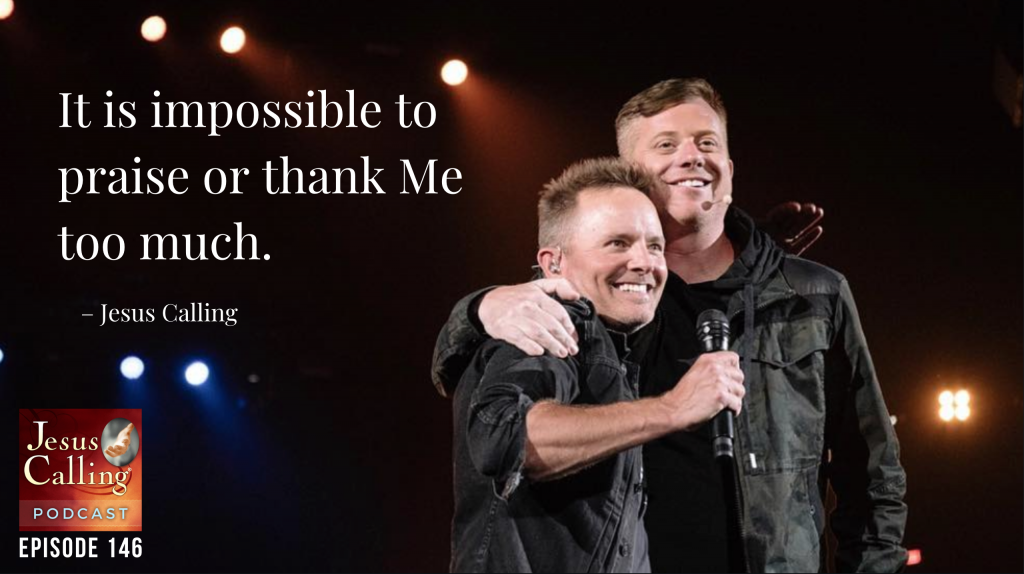
Chris: If you kneel, it automatically puts you in a posture in your heart that is so different than when you’re sitting or standing. If you kneel, everything changes inside. You cannot kneel before God and think, Wow, I am amazing right now. It’s a humble place. When you lift your hands, it does something inside of you.
Moving from Worry to Worship: Chris Tomlin & Darren Whitehead – Episode #146
Narrator: Welcome to the Jesus Calling Podcast. Our guests today are GRAMMY Award-winning worship leader Chris Tomlin and pastor and author Darren Whitehead. Chris and Darren share insight toward unlocking the mysteries in how we praise God, and how our lives are transformed when we learn to live a life of praise. We also hear the story behind Chris’s praise and worship song known around the globe, “How Great Is Our God,” and Darren tells us how to spot God working in our lives in ways we may not expect. They weave some of these thoughts in the new book they’ve written together called Holy Roar: Seven Words That Will Change the Way You Worship.
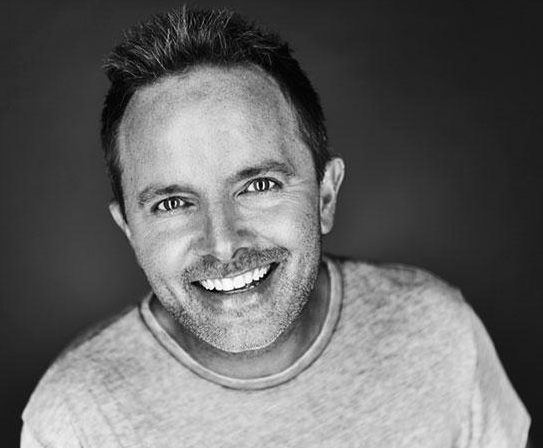
Chris: I’m Chris Tomlin. I’m a songwriter and musician. I’ve been traveling and touring for over 20 years now. I live in Franklin, Tennessee, but I’m a Texan through and through. I was born in East Texas. And yeah, it’s been an amazing journey. I’d have never thought that these little songs I started writing when I was a bit younger would have gone around the world like they have. But for me, I would probably say I spent most of my life chasing my songs around the world.

Darren: My name is Darren Whitehead. I’m the senior pastor of Church of the City. We’re in Nashville and in New York. We have seven different locations: five in the Nashville area and then two in New York City.
And as you can tell, I’m originally from Mississippi—no, I’m from Australia, and I moved to the United States in 1998. So it’s been 21 years that I’ve been living in this beautiful country.
7 Words That Will Change the Way You Worship
Chris: [One day] we were sitting in our church here at Church of the City in Franklin, Tennessee. Darren began this message on praise, and I immediately checked out, if we can just be honest on this podcast. I immediately checked out.
Darren: Lots of people check out when I start preaching, so it’s kind of normal.
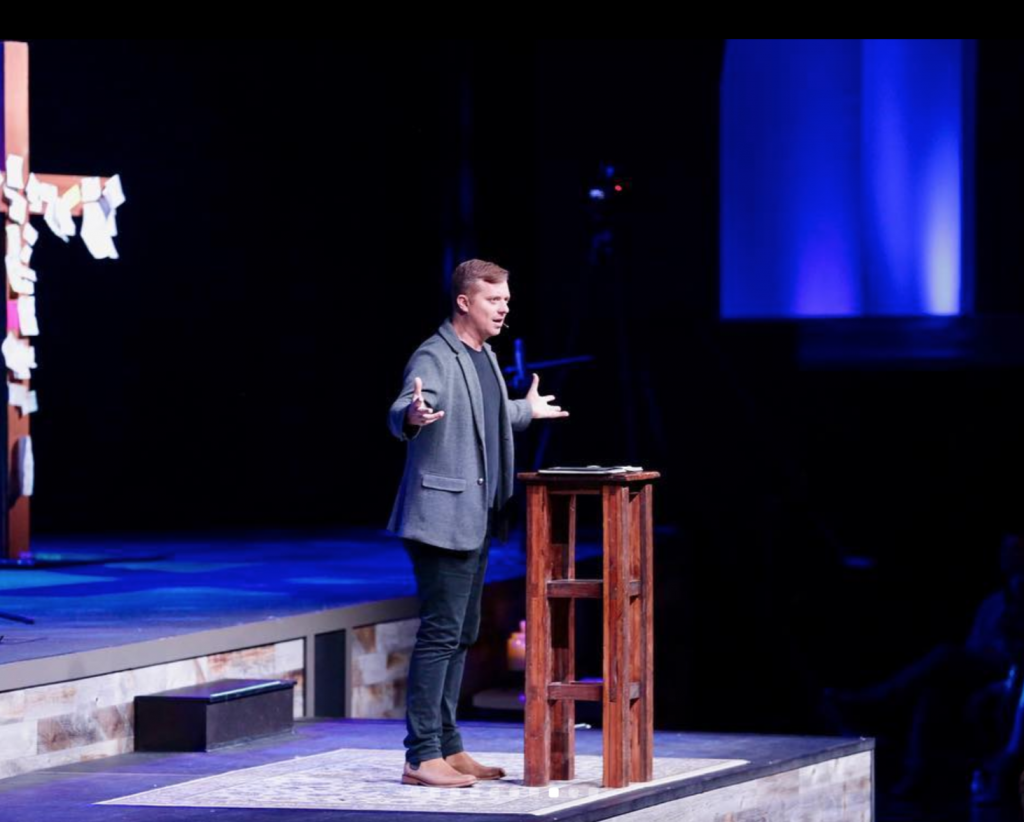
Chris: Wow, the music was good. Here comes Darren.
I’m just kidding. I wasn’t checked out. I was like, Okay, this is interesting. But what I thought was like, I’ve heard every message on worship you could possibly give,” right? I give those around the world. I talk about this. This is what I spend my life doing. How have I never heard this before? This is game changing.
I could feel it in our congregation that morning. You could just feel [everyone thinking], Wow, this is a revelation from the scriptures that I don’t think most of us have ever heard on why we praise God and what it means to praise God.
As soon as I got out of the service, I was texting Darren, blowing his phone up, saying, “That may be the most powerful and most important message on praise I have ever heard in my life. Everyone needs to hear this. You need to write a book.” I just kept saying, “You need to write a book on this. This is so powerful.”
“That may be the most powerful and most important message on praise I have ever heard in my life. Everyone needs to hear this.” – Chris Tomlin, reacting to Darren Whitehead speak about worship
Because I thought, If I’ve never heard this, and this is what I think about all the time and do, then how many people are sitting around in churches all over this country and don’t know this is what the scripture really says about praise?
And so that started this journey, this very unlikely journey of the two of us writing this book together called Holy Roar.
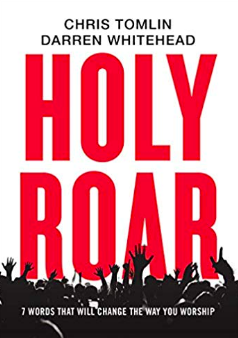
Darren: It was.
Chris: I especially love the little subtitle: Seven Words That Will Change the Way You Worship.
Darren: Many people know that in the New Testament, there are four Greek words for the word “love.” There’s eros, storge, agape, and phileo. They all mean something slightly different, but they’re all translated into the English word “love.”
In the Psalms, there are seven Hebrew words for the English word “praise.” It’s all translated “praise.” So anytime you see “Praise the Lord” or “I will praise You” or any of the time the word “praise” shows up, it’s one of seven different Hebrew words. All of this is hiding underneath the surface.
Holy Roar is our best attempt to explain what each of these seven words actually mean, and they all mean something slightly different.
One means to lift your hands in the presence of the Lord.
Another means to sing a new song.
Another means to shout.
Another means to kneel.
As you learn a little more about each one of these words, it actually changes the way you worship. That has been the testimony of so many people that have read the book, and we’re thrilled to hear that, because it’s grown their understanding of what praise actually means.
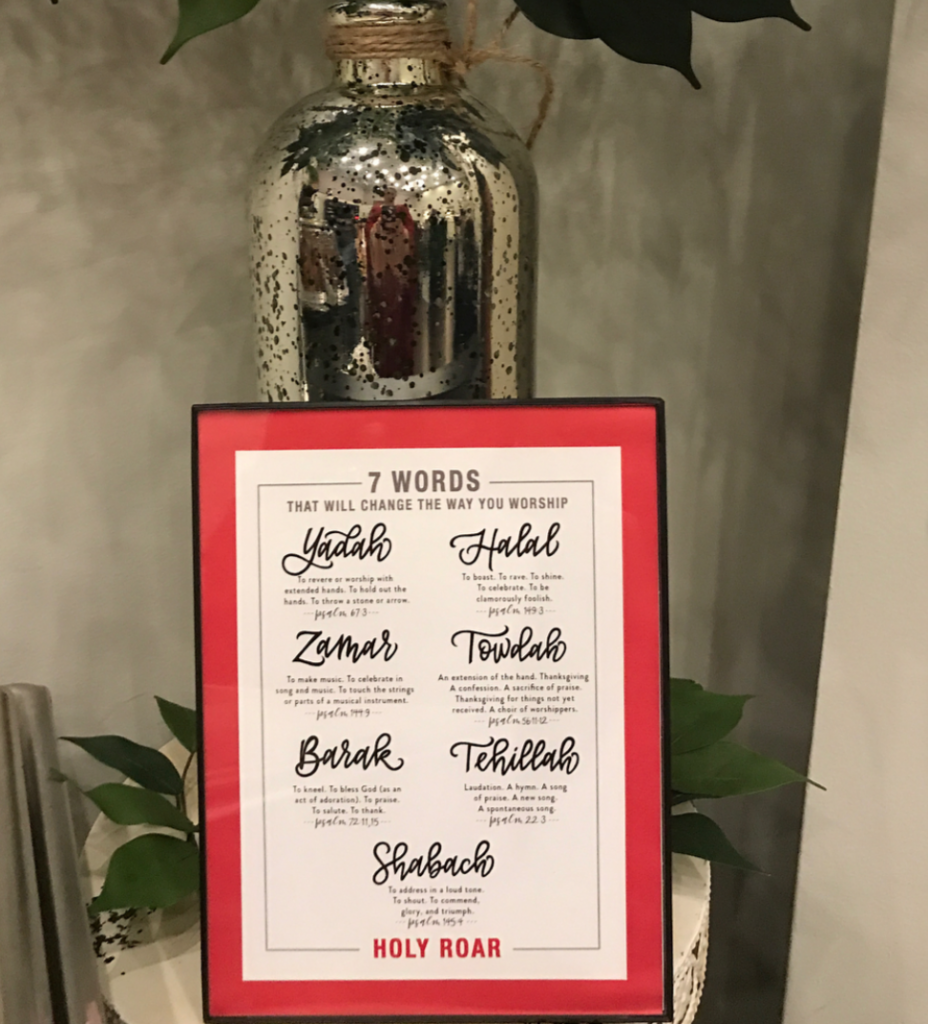
Chris: And it informs what you’ve maybe already been doing.
Darren: One of the words is toldah. And toldah is a very, very special word to me, one of my favorites. Specifically the definition is, “Toldah is an extension of the hand, thanksgiving, a confession, a sacrifice of praise, thanksgiving for things not yet received.”
And what is so beautiful about this is the idea of toldah is the idea of lifting your hands in praise. It’s thanking God for what He has done, but it’s also thanking God for what He has not yet done. It is lifting your hands in faith. It is lifting your hands and praising Him because of who He is, because His promises are true, because His character is trustworthy. And you’re saying, “I’m choosing to put my trust in You instead of in my circumstances. So I’m going to thank You for what has happened, but I’m also going to praise You for what has not yet happened, what I’m believing for.”
“Toldah is the idea of lifting your hands in praise. . . . It’s thanking God for what He has done, but it’s also thanking God for what He has not yet done.” – Darren Whitehead
I had a friend many years ago, a man who walked with Jesus like few people that I’ve never met. His name was Ken, and we worked together.
One day I was in his office, and he said, “Pray for me. I’ve got a situation going on with my family. My daughter was at a party last night and she has not come home, and we don’t know where she is.”
I said, “Mate, you must be worried out of your mind.”
He said this—I’ll never forget this—he said, “I don’t worry. I worship.”
You see, when he was tempted to be thinking on that which was out of his control, he instead focused on the One who is in control, and he actually moved his worry to worship. Instead of being stuck in worry, he actually proactively lifted his eyes and started to worship the One who’s in control. And I’ve never forgotten that.
“This is the essence of toldah. It is, ‘I will trust You when I’m uncertain. I will trust You when I’m afraid. I will worship You when I’m anxious. I will lift my hands to You for that which has happened and that which has not yet happened. I will trust You.’” Darren Whitehead
The Story Behind “How Great Is Our God”
Chris: It’s amazing to me how music is the universal language of the world. Right? We all speak different languages, but everybody speaks music. It’s amazing. Wherever I go, it brings people together like no other thing can do. And it’s so powerful.

One of the examples for me was the song “How Great Is Our God.”
In the book Holy Roar, I talk about this song with the word shevach, which is one of the seven Hebrew words of praise, and how that song to me really captures that word, shevach.
When I wrote [“How Great Is Our God,”] I had no idea it would become the song it became.
I can remember sitting in my little apartment condo in Austin, Texas, on my sofa with my guitar. I can still see it on the coffee table looking at Psalm 104, and it says, “You, oh Lord, are very great. You’re clothed with splendor and majesty. You wrap yourself in a light as a garment.” And it has these beautiful expressions of the power of the majesty the greatness of God.
I just started to strum my guitar and just started singing that chorus. “How great is our God.” It was very simple. I didn’t really think, This song is going to go around the world and people are going to sing it. There was none of that.
Fast forward a few years, and now this song has taken off. People are singing it, and it’s been translated in all these languages.
When I was recording this song, I could just hear this . . . choir. I could hear a children’s choir singing this with me. I just had this feeling.
I only knew one children’s choir, and it was the Watoto Children’s Choir out of Uganda. Most of these kids are AIDS orphans. But it’s just beautiful ministry in Uganda that takes these kids and gives them a chance in life. It’s beautiful what they do.
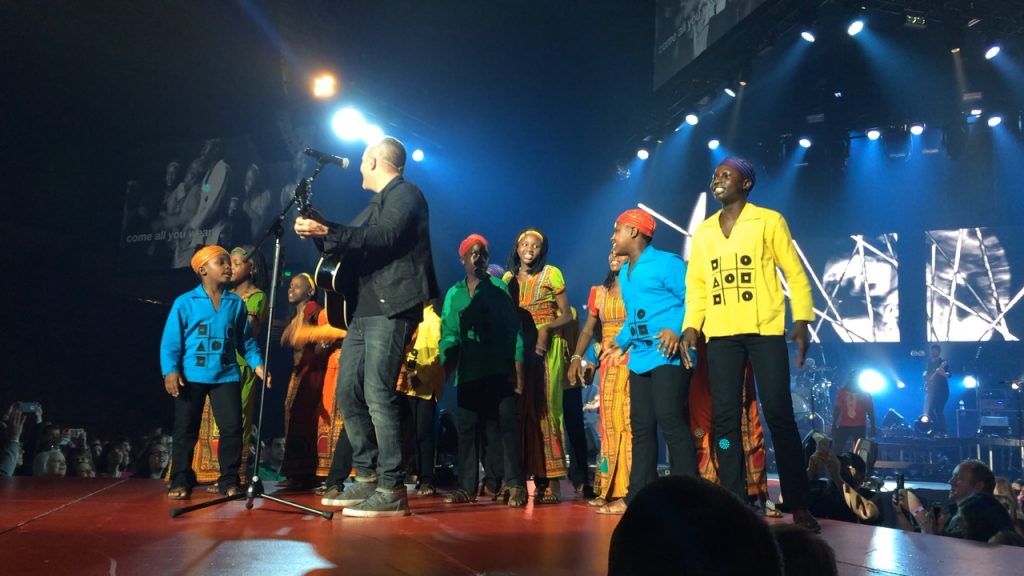
They put these choirs together, and they travel all over the world, and they sing. I mean, they light up a room when they sing. They’ve sung for kings, for presidents all over the world. They’re amazing, beautiful kids.
I thought, Oh, I could reach out to see if they had some recording equipment in Uganda. I could send it to them and say, “Would you guys, could just sing something on this?”
I get in touch with one of the leaders, and he says, “Well, actually we’re in Nashville next week.”
And I was like, “What?! I’m in the studio at such-and-such these days.”
And they said, “We’re on a six-month tour of the United States, and we’re in Nashville on a day off. And it’s next week when you’re recording.”
I was like, Okay, Lord. I mean, this is obvious.
I remember them coming in that day, and I said, “Well, I’d love for you to come sing with me in the studio.” And we were in Ocean Way Studio in Nashville. I remember them walking in and these beautiful kids, there was about 20 to 30 of them. They’re six years old, seven years old, eight years old. They have not been a studio like this before. It’s microphones everywhere. You’ve got band. You’ve got musicians everywhere. They were kind of like, “What in the world?” You could just tell there was a look of a little nervousness.
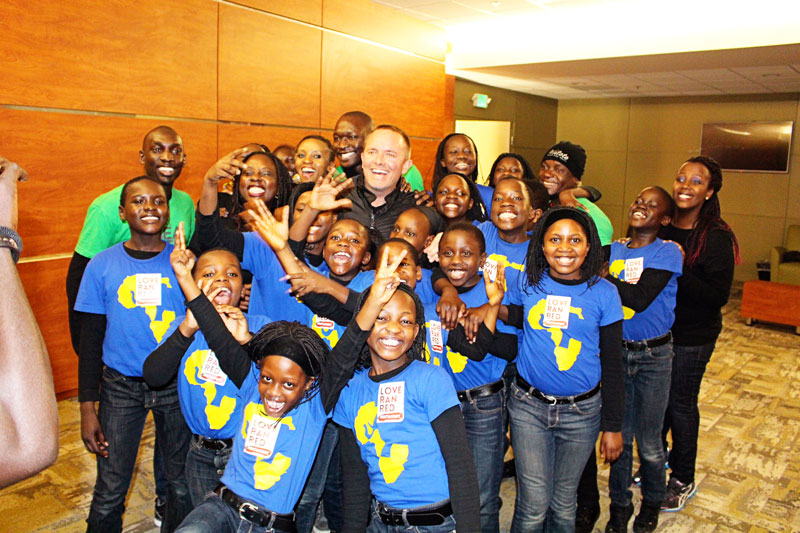
I was sitting in the booth like in the control room, and they were out where they were going to be singing, and I just remember their leader saying, “Hey, guys, let’s just get comfortable. Let’s just start singing. Let’s just start worshipping God.” And all these kids just start singing “How Great Is Our God.”
They have no idea who I am. I mean, they were a six year old kids in Uganda, they’re AIDS orphans. And I’m sitting there, and it wasn’t like, “Hey, it’s Chris. Chris is here. Let’s sing ‘How Great is Our God.’” That was just the song they sang.
And I mean, tears start coming in my face. I was thinking, How do you write a song in your little apartment in Austin, and it makes its way to an orphanage in Uganda?” It was one of the most humbling moments of my life. I was thinking, Wow, Lord, it’s amazing.
Just to be a part of that, just to be part of His kingdom in that way, it’s just so beautiful.
Tracking God’s Blessings & Miracles in Jesus Calling
Darren: When we make praising God a lifestyle, He guides us in ways that we are aware of and ways that we are not aware of.
I think about when I moved to the United States. I was working in radio, and I came to the United States to work in radio. That’s what I thought I was doing.
“When we make praising God a lifestyle, He guides us in ways that we are aware of and ways that we are not aware of.” – Darren Whitehead
I went to Melbourne, Australia, to the American embassy, and I lined up with a bunch of other hopeful immigrants to try to come to the United States to work at this radio station. And as I applied for this particular visa, they worked on it and so forth, and then they ended up handing me a visa.
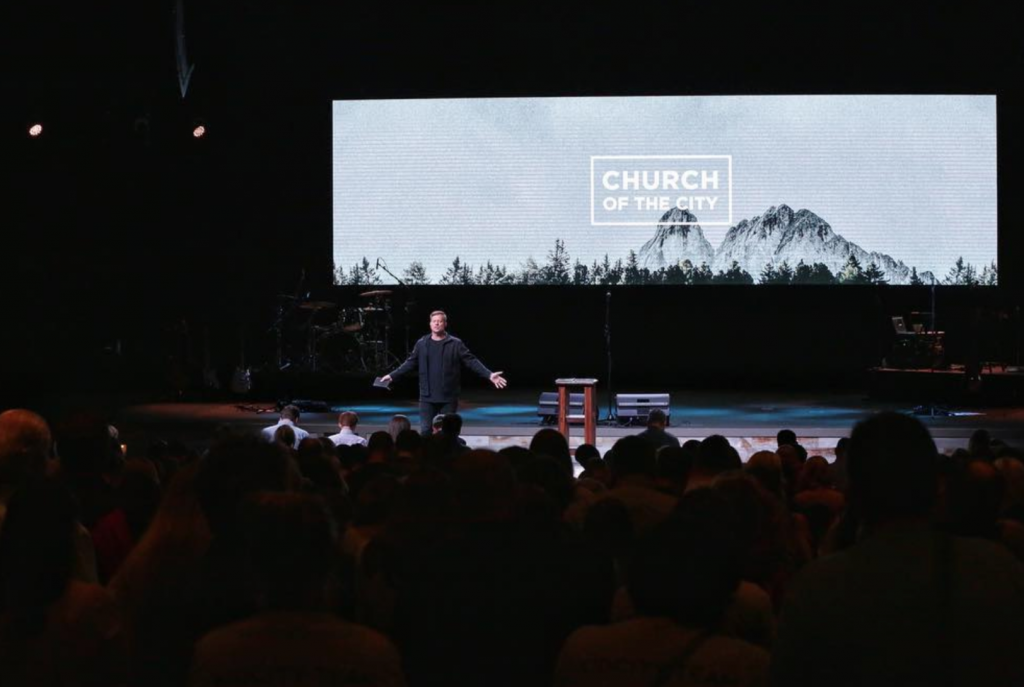
As I opened it up, I realized that giving me the wrong kind of visa. They actually gave me a visa that I wasn’t even eligible for. They gave me a pastor’s visa. And I’m thinking, They have made an administrative error, but there’s really nothing I can do about this. They’ve given me a pastor’s visa. I’ve never been a pastor before. I have no plans of ever becoming a pastor. And yet to go to America, now I’ve got to be a pastor.
Sometimes people ask me, “How did the Lord call you into the ministry?”
I say, “The U.S. government called me into this thing.” And out of fear of deportation, I just keep preaching every single week. This is what I do.
I know that it’s a really serendipitous story of being called into the ministry of the Word at a church, but that’s my story. That is actually how God has guided me. And little did I know that He was guiding me in ways that I completely was unaware of, but that He had wired me and He had called me to work at a church, in ministry, as a pastor. And He guided me through the process of the American government and the embassy and the INS in allowing me to come to the U.S. with a religious worker or a pastor’s visa.
Interestingly, we planted our church six years ago. We were quite nervous when we were planting our church. Church planting is kind of a risk, you know. I have a wife and three daughters, and I’m not sure whether this is going to work. And so we were quite nervous.
And my wife has been doing the daily devotions for Jesus Calling for many years. And what she would do, on the Jesus Calling book that she has, there’s this space around the area, and she would write the details of what was happening on each of the days as she was reading it each day.

She got through the first year, but what was fascinating is the next year, she was looking day by day on the things that had happened on each of the same days. And she would see that the things that we were praying for or the things that we were asking God for on one particular day was one thing. But then we’re looking at a year later and seeing how dramatically things have changed the next year, and the specificity that she would feel from the words that came day by day in Jesus Calling was really quite remarkable.
Now the reason that’s particularly significant is that six years ago, we planted our church, and we’ve really had a pretty remarkable story. Our church has about 7,000 people coming now. And so you can imagine that year to year, there’s been dramatic changes. We’ve gone from dozens of people to hundreds of people to thousands of people. And when we look at the things that we were praying for on any particular day, and then look at the following year, it’s incredible to see the difference a year makes, and then how specific the words on each of these different days are speaking directly into the situation we’re in. And then a year later, in a completely different way, speaking directly into the situation again.
Jesus Calling has been actually a treasured part of our story, and it has tracked with us year by year through my wife’s devotionals.

Chris: This is January 7th in Jesus Calling. This a devotional for that day.
It is impossible to praise or thank Me too much. As it is written, I inhabit the praises of My people. Sometimes your adoration is a spontaneous overflow of Joy in response to radiant beauty or rich blessings. At other times your praise is more disciplined and measured—an act of your will. I dwell equally in both types of praise. Thankfulness, also, is a royal road to draw near to Me. A thankful heart has plenty of room for Me.
When you thank Me for the many pleasures I provide, you affirm that I am God, from whom all blessings flow. When adversity strikes and you thank Me anyway, your trust in My sovereignty is a showpiece in invisible realms. Fill up the spare moments of your life with praise and thanksgiving. This joyous discipline will help you live in the intimacy of My Presence.
“Worship is, it’s universal. It is a universal language. And just to play a small role in that has been an incredible journey in my life.” – Chris Tomlin
“Good Good Father” Becomes a Kids Book
Narrator: One of Tomlin’s most beloved songs is the award-winning hit “Good Good Father.” He and song co-writer Pat Barrett wanted to turn the message of “Good Good Father” into a book to help young children learn who God is, and through that process Chris encountered some unexpected surprises.
Chris: The idea [for a kids book] just came to me one day.
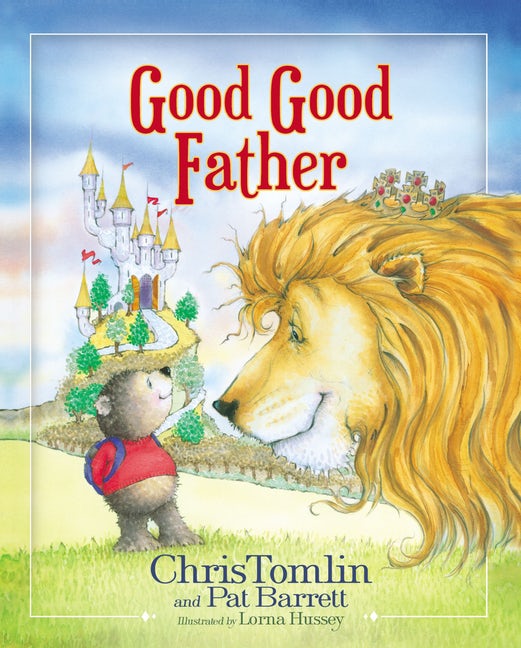
I went to Pat and I said, “Pat, I’ve got this idea for this for our song, ‘Good Good Father,’ the song we’re working on. What would you think about it being a children’s book?”
And he’s like, “Are you kidding me?”
I was like, “No.” And I gave him this idea. I said, “You know, what if it was,” I’ll never forget. I had I had two daughters, right? “So what if it was this little girl, and she’s traveling through all these villages, and she’s meeting all these different people who tell her one thing about God? And the next thing, in the next village, they tell her something else about God?”
The first line of the song is “Oh, I’ve heard a thousand stories of what they say You’re like.” With just that one line, the whole idea of the book came to me. I was like, “Wow. If you could show all these different attributes of God, and that maybe the child gets confused. And oh, the one town says he’s a warrior. The next town says, ‘No, no, no, He’s more like a farmer.” And one town says, “No, no, no, He’s more like a doctor.” And she’s confused. She’s like, “I don’t know who this great King is. Is this God, this King? Who is this King? I want to know this King.”
When she gets to meet the King, she’s like, “I’m confused. I don’t know who You are. Everybody says You’re this, You’re that, You’re that.”
And the King can say, “I’m all these things. I’m a good Father. The father does all these things. That’s what a father is. He provides. He protects. He is a warrior. He is a doctor. He wants to look after you. He is a farmer. He does provide freedom. He’s all these things.”
I send this to Pat, that’s all I said. The next day in my email is the whole thing written out from Pat. I’m just like, “Who is this guy?” He had every conversation written.
He said, “Man, I couldn’t sleep. This was it.”
We had just the best time making this book. Then I take it to the publisher, and they say, “This is really nice, but it’d be really great if it was animals.”
I was like, “Animals?”
So I went back to Pat, and I was like, “Pat, they said they’ve got to be animals.”
And he’s like “Okay.”
The next day, it’s all redone. Now it’s this little bear going to see turtles and raccoons and squirrels and all these different things. And I was like, “Oh, this is fun.”
And then we bring it back to our publisher, and they’re like, “Nice, we got it to second base. Now the bear needs to have a name,” because all we had was “Bear.” That was our that was our name for our character.
Darren: Creative.

Chris: I’ll never forget this conversation, it’s one of my favorite things that’s ever happened. We’re sitting around this roundtable, and all the publishing team’s in there, and they’re like, “You know, the bear needs to have a name. Like Corduroy. That’s like a great name, that was such a good book. Kids love that.”
And I was like, “Yeah, my kids loved the Corduroy books. They love these books with Corduroy. The bear needs to have a name.”
So I go back to Pat, and I was like, “Guess what? Our bear needs to have a name.” I was telling Pat on the phone, “Like Corduroy.”
And he just starts laughing. And I’m like, “What are you laughing about?”
He said, “Oh, well, that was my great-uncle [who] wrote those books.”
I was like, “What?! All these children’s books have come from your family?”
He said, “Yes, it’s like one of our prized things of our family. That’s my mom’s uncle [who] wrote the Corduroy books.”
And I’m just like, “No wonder you can just downloaded a children’s story like that.”
Darren: It’s genetic.
Chris: It’s genetic!
Our bear became Tucker, and the Good Good Father story finally came to be. It’s been so fun to read it to my own kids and just teach them about God as being all these things. There’s all these different things of what a good father really is and [different ways] for kids to understand God as a father.
Declaring God’s Worship to the Next Generation
Darren: We’re also seeing around the country, and certainly in our church, young people that are rising up and just embracing with their hearts the power of what it means to be praising and worshipping God.

Recently in our church, a couple of kids who were in high school in our local area, they had such a heart for worship and they started reaching out to other kids in other high schools.
Now this was just a bunch of kids. There are no adults that were involved in this. This was a collection of 15-year-old and 16-year-olds. But they just said, “What if, instead of our high schools being known for rivaling one another at football games, what if we were united together for a night of worship?” A bunch of kids did this.
So they reached out to some other friends from another high school, and then another high school, and another high school, and they started promoting this on social media. They came to me and said, “Could we like do something? Could we use the building to like have a worship time?”
And I thought, This is so sweet. These kids want to do it.
I said, “What room do you want? You know you want one of our backrooms?”
They like, “No, we want the main auditorium.”
I’m like, “Bro, that’s going to look kind of rough, you know, a big auditorium with a handful of kids.”
And they’re like, “Well, we think we’re going to have some more.”
And I’m like, That’s so sweet that they think that. [And I said,] “But if you want it, then okay.”
These kids start promoting on social media that the county schools are gonna unite together. And the county’s Williamson County, and they called it “WillCo Unite.” And so it rolled around, and they had 1100 kids all show up to worship together.
And I’m telling you, so there’s no grownups involved, there’s no adults. We’re just standing at the back, and we’re looking at this going, “This may be the most holy thing I’ve ever seen, is a bunch of teenagers saying, ‘We are about uniting together to worship Jesus together.'”
One thing I love about consistently the themes in the Psalms is that it says that one generation shall declare to the next generation the goodness of God.
That word, incidentally, that word “declare” is actually the word shevach. And it’s translated “praise” in many cases. In this case and in some translations, it says “praise.” But in the NIV it says “declare.” One generation shall shevach to the next generation. And I love the beauty and the unity of just one generation singing the faithfulness of God to the next generation.
“I’ll Never Praise God the Same”
Chris: One of the things I’ve tried to convince Darren of and have done a really good job of convincing him of is [one day] I was like, “Darren, wherever I go for the next,” I thought for the next six months, it’s turned into almost two years.
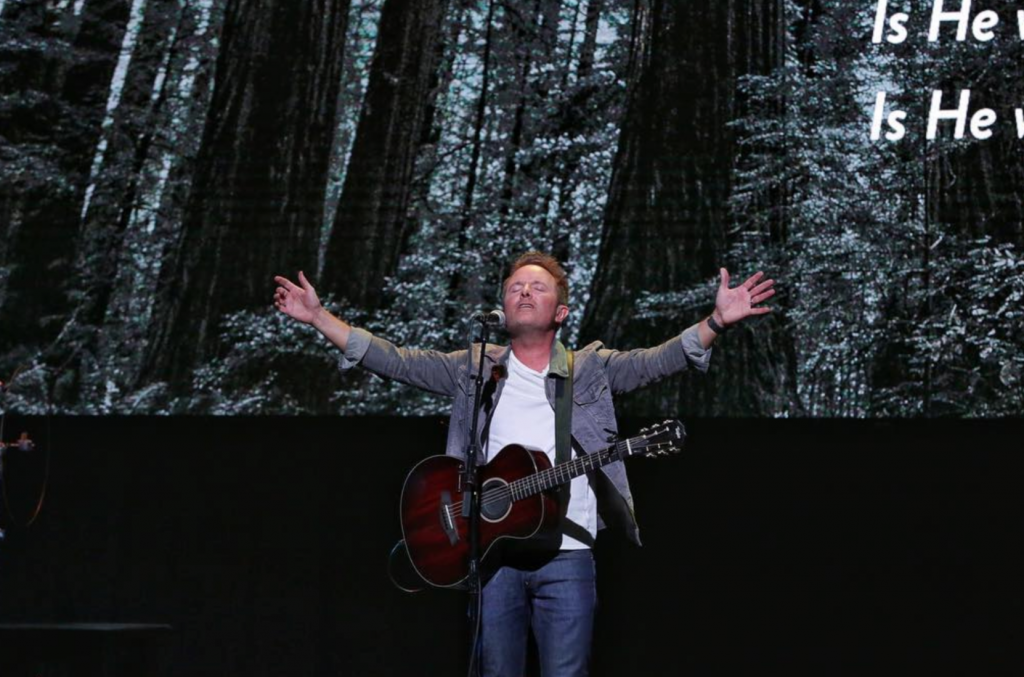
Darren: That’s right.
Chris: “Wherever I go, whatever city I go, would you come and share this message? I think it will change the night every night.”
We’re on the road now. This whole spring is covering more cities that we haven’t been to with this message. And just as I thought, it has come true. Every night the concert before Darren, I call it “BD, AD.” The concert before Darren is one thing, and then after he shares his message and we come back up and we lead again, it goes back into the music, it’s a completely different night. Every single night. That is the beauty of this message, and I think that’s why this message is so important for the church because people grab it.
I’ve had so many people come to me and meet and greets afterwards, I can’t tell you.
I’ll never forget this one guy. He’s like, “I am so frustrated.”
I was like, “Nice to meet you.”
I remember he was a Catholic brother, and he goes, “My priest knows this message, and he knows about these words, and he hasn’t told us about these words? This is a game changing. I want my whole church to know this is what praise is!”
And then the next person: “Hey, at my church, I’ve never heard this. We’ve never heard this message. We want our people to hear this message.”
And then next, I’ll meet somebody else. “I had no idea this is what’s in the scripture about praising God. I’ll never praise God the same.”
Every night of this tour, it’s been so powerful to see what’s happened with this message. And so yeah, we’re taking this all around the country. That’s why it’s called the Holy Roar Tour.
Darren: What we hope people will get from this book is an expanded understanding of what it really means to praise God.
Chris: I think this book could really change the way so many churches across this nation respond in praise, because it’s God’s Word. It’s not just two guys writing the thing just to pump people up. This is God’s Word of saying, “This is what praise is.”
Narrator: To learn more about Chris and Darren’s new book Holy Roar and to find out where you can see their Holy Roar Tour, please visit holyroar.com.
Narrator: If you’d like to hear more stories about finding the power of God through music, check out our interviews with country music stars The Oak Ridge Boys and Aaron Watson.
Narrator: Next time on the Jesus Calling Podcast, we speak with former Olympic runner Ryan Hall. Like any sport, running requires a high level of perseverance to push through fatigue and finish the race. Ryan reflects on a particular verse that was pivotal to his athletic success.
Ryan Hall: Being on the other side of my journey, having been to two Olympics, what I’ve learned it took the most of was resilience—just getting back up over and over and over again. One of my favorite verses in the Bible says, “Though righteous man falls seven times, he rises again.” And I can’t tell you how many times I just would remind myself of that verse.

